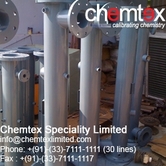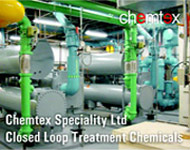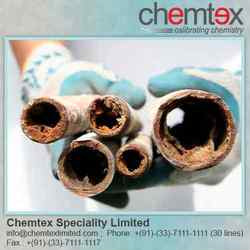
 Cleaning Chemicals play a vital role in making the machines and equipments to operate & function properly. Some major industrial coolant & heating machines & equipments go out of work due to the problems like dirt, dust, grease, oil and presence of inorganic and inorganic foulants. These problems are removed by using Chemtex’s offered range of cleaning chemicals while improving the efficiency and functionality of the machines. Due to small negligence and mistake cooling & heating equipments can get crash and be insensitive to work. We implement closed loop system maintenance which is a vital part of HVAC and ACnR maintenance program. this maintenance program can overcome the bigger loses like power loss, system efficiency loss, HTF (Heat Transfer Fluid) and Refrigerant fouling and degradation, loss of system life, un-scheduled maintenance jobs for de scaling and fixing leaks and bursts due to corrosion. The major area of Closed loop maintenance are being employed in Chemtex Speciality Limited which include Proper system cleaning & passivation after commissioning and corrosion Control. More detail information about above matter is available at www.chiller-chemicals.com.
2 Comments
 A chiller is a machine that removes heat from a liquid via a vapor-compression or absorption refrigeration cycle. This liquid can then be circulated through a heat exchanger to cool air or equipment as required.
Cooling towers are heat removal devices used to transfer process waste heat to the atmosphere. Cooling towers may either use the evaporation of water to remove process heat and cool the working fluid to near the wet-bulb air temperature or in the case of closed circuit dry cooling towers rely solely on air to cool the working fluid to near the dry-bulb air temperature. Biocides and MicroBiocides are chemicals that prevent and eradicate unwanted biological fouling from the system. Biocides are of various nature such as oxidizing, non-oxidizing, cationic, anionic etc. Biological Fouling or Biofouling is the undesirable accumulation of micro-organisms, algae and diatoms, plants, and animals on surface, pipelines and heat-exchangers of cooling systems. Bio-fouling can be of aerobic (that require oxygen) or anerobic (that don't require oxygen) organisms. In general the former is found in Cooling Towers and the later in closed circuit systems. Another very important reason for using Cooling Tower Micro Biocides in cooling towers is to prevent the growth of Legionella, including species that cause legionellosis or Legionnaires' disease, most notably L. pneumophila, or Mycobacterium avium. The various Legionella species are the cause of Legionnaires' disease in humans and transmission is via exposure to aerosols—the inhalation of mist droplets containing the bacteria. Common sources of Legionella include cooling towers used in open recirculating evaporative cooling water systems, domestic hot water systems, fountains, and similar disseminators that tap into a public water supply. Micro biocides function in eradication of sulfate reducing bacteria, aerobic and anaerobic bacteria that are formed and found in Cooling Tower Water.Micro Biocides are very vital for Closed and Open Circuit Cooling Water Treatment. TCF (Totally Chlorine Free) micro biocides are compatible with heat transfer fluids (HTF) and can be used without any fear of corrosion of chlorine addition to the system or depletion or degradation of HTF and corrosion of PHE (plate type heat exchangers) Chemtex’ s Closed loop Micro biocide surpasses the performance of other such less effective closed loop treatment chemicals (such as Nalco 7330, Nalco 77352NA etc.) Application: Engine Jacket, Chiller Water Circuit, Glycol Brine System, Hot Water Circuit, Engine Coolant, Process chilling and heating etc. Specification:
Dosage: The amount of Closed Loop Biocide required to inhibit or remove bio fouling depends on the type of system, application, re-circulating fluid property and plant operating conditions. The specific dosage rates will be specified by the CSL technical representative. Major Benefits:
To prevent the growth of virus bacteria in cooling tower, Chemtex’s Closed Loop Chiller Water Non-Oxidizing Microbiocide is the best solution. To know more, mail to [email protected] or call to +91-33-71111111. Not only about the above chemical but also the details of other type of industrial chemicals like inhibited glycols, water treatment chemicals, boiler chemicals, ro chemicals, cooling chemicals, heat transfer fluids, Acid inhibitors (Rodine Type), cleaning chemicals, descaling chemicals etc can be found in above contact details. Nitrite based Corrosion Inhibitors for chilled water systems is a multi-metal corrosion inhibitor based on nitrite and other organic compounds with special yellow metal corrosion inhibitor and anti-scaling agent that helps to prevent scale deposition or also removes adhering loose scale deposits from the heat transfer fluid system. There are several disadvantages for not treating the closed circuit water and in long run it can create troubles for the system operator. The corrosions caused by chiller water, Mono Ethylene Glycol or Brine can cause system leakage in PHE (Plate Heat Exchanger) and AHU (Air Handling Unit). Corrosion can also cause plugging and clogging of tubes and thus reduce flow rate. This will affect the heat transfer rate and will force the system to reduce heat transfer efficiency. This way the system needs regular descaling that incurs shutdowns, leads to additional costing for labor and wastage of time. “Scale” is a hard deposit of inorganic material on heat transfer surfaces. This is caused by gradual precipitation of mineral particles in water on the surface. During the evaporation of water in a evaporative condenser, pure water vaporizes out and the dissolved solid materials concentrate in the remaining water on the surface. The solids will then settle in pipelines or on heat exchange surfaces, where it frequently solidifies into a relatively soft, amorphous scale. Next to scale, the next most important concern is the prevention of “corrosion”. Corrosion is defined as the destruction or loss of metal through chemical or electrochemical reaction with its surrounding environment or material. Mild steel is a most commonly used metal in the cooling water system. But this metal is most susceptible to corrosion. However in some waters and in presence of dissolved gases, such as H2S or NH3, the corrosion to these metals is more severe. Common problems arising from corrosion are reduction in heat transfer and water flow resulting from a partial or complete blockage of pipes, valves, strainers, etc. Also, excessive wear of moving parts, such as pump, shaft, impeller and mechanical seal, etc. may resist the movement of the equipment. Hence, thermal and energy performance of heat exchange may degrade. The water treatment in closed system is thus not very critical. Once the initial volume is chemically treated, the quality of the circulating fluid needs to be monitored on a regular basis and additional chemicals added as required to maintain recommended residual concentrations of treatment chemicals. Most closed-loop water systems use a sodium nitrite based inhibitor for corrosion control and a biocide to prevent biological contamination. These inhibitors will protect both the ferrous and non-ferrous materials in your piping system. The major advantages of using nitrite based corrosion inhibitor are as follows:-
Dosage: Nitrite based Corrosion Inhibitor for Water and Glycol Brine is normally fed continuously to the re-circulating closed system by injection dosing pump or dosed to the expansion tank. The amount of Nitrite based Corrosion Inhibitor for Water and Glycol Brine to inhibit corrosion depends on the type of system and plant operating conditions. The specific dosage rates will be specified by the Chemtex's technical representative. 
|
 RSS Feed
RSS Feed